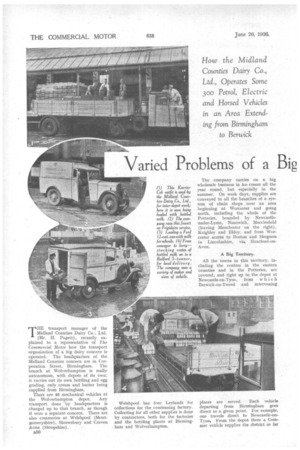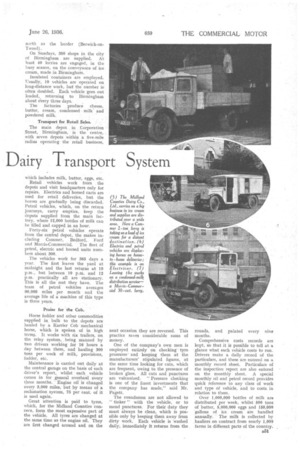Varied Problems of a Big Dairy Transport System
Page 92

Page 93

If you've noticed an error in this article please click here to report it so we can fix it.
THE transport manager of the Midland Counties Dairy Co., Ltd. (Mr. H. Pagett), recently explained to a representative of The Commercial Motor how the transport organization of a big dairy concern is operated. The headquarters of the Midland Counties concern are in Corporation Street, Birmingham. The branch at Wolverhampton is really autonomous, with depots of its own; it carries out its own bottling and egg grading, only cream and butter being supplied from Birmingham.
There are 46 mechanical vehicles at the Wolverhampton depot. Any transport done by _headquarters is charged up to that branch, as though it were a separate concern. There are also creameries at Welshpool (Montgomeryshire), Shrewsbury and Craven Arms (Shropshire).
B50 Welshpool has four Leylands for collections for the condensing factory. Collecting for all other supplies is done by contractors, both for the factories and the bottling plants at Birmingham and Wolverhampton. The company carries on a big wholesale business in ice cream all the year round, but especially in the summer. On week days, supplies are conveyed to all the branches of a system of chain shops over an area beginning at Worcester and going north, including the whole of the Potteries, bounded by Newcastleunder-Lyme, Nantwich, Macclesfield (leaving Manchester on the right). Keighley and Ilkley, and from Worcester across to Boston and Skegness in Lincolnshire, via, Stratford-onAvon.
A Big Territory.
All the towns in this territory, including the centres in the eastern counties and in the Potteries, are covered, and right up to the depot at Newcastle-on-Tyne, from which Berwick-on-Tweed and intervening places are served. Each vehicle departing from Birmingham goes direct to a given point. For example, one travels direct to Newcastle-onTyne. From the depot there a Cornuser vehicle supplies the district as far north as the border (Berwick-onTweed).
On Sundays, 350 shops in the city of Birmingham are supplied. At least 40 lorries are engaged, in the busy season, on the conveyance of ice cream, made in Birmingham.
Insulated containers are employed. Usually, 10 vehicles are operated on long-distance work, but the number is often doubled. Each vehicle goes out loaded,., returning to Birmingham about every three days. . The factories produce cheese, butter, cream, condensed milkand powdered milk.
Transport for Retail Sales.
The main depot . in , Corporation Street, Birmingham, is the centre, with seven depots within a sfive-mile 'radius operating the retail business,
which includes milk, butter, eggs, etc.
Retail vehicles work from the depots and visit headquarters only for repairs. Electrics and horsed carts are used for retail deliveries, but the horses are gradually being discarded. Petrol vehicles, which, on the return journeys, carry empties, keep the depots supplied from the main factory, where 12,000 bottles of milk can be filled and capped in an hour.
Forty-six petrol vehicles operate from the central depot, the makes including Commer, Bedford, Ford and Morris-Commercial. The fleet of petrol, electric and horsed units numbers about 300.
The vehicles work for 365 days a year. The first leaves the yard at midnight and the last returns at 10 p.m., but between 10 p.m. and 12 p.m. practically all are stationary. This is all the rest they have. The team of petrol vehicles averages 90,000 miles per month and the average life of a machine of this type is three years.
Praise for the Cob.
Horse fodder and other commodities supplied in, bulk to the depots are hauled by a ICarrier Cob mechanical horse, which is spoken of in high terms. It works with six trailers, on the relay system, _ being manned by two drivers working for 16 hours a day between them, and hauling 300 tons per week of milk, provisions, fodder, etc.
Maintenance is carried out daily at the central garage on the basis of each driver's report, whilst each vehicle comes in for .general overhaul every three months. Engine oil is changed every 3,000 miles, but by means of a reclamation system, 75 per cent, of it is used again.
Great attention is paid to tyres, which, for the Midland Counties concern, form the moat expensive part of the vehicle. All tyres are changed at the same time as the engine oil. They are first changed around and on the next occasion they are reversed. This practice saves considerable sums of money.
One of the company's own men is employed entirely on checking tyre pressuresand keeping them at the manufacturers' stipulated figures, at the same time looking for cuts, which are frequent, owing to the presence of broken glass. All cuts and punctures are vulcanized. " Pressure checking is one of the finest investments that the company has made," said Mr. Pagett.
The roundsmen are not allowed to " tinker" with the vehicle, or to mend punctures. For their duty they must always be clean, which is possible only by keeping them away from dirty work. Each vehicle is washed daily, immediately it returns from the rounds, and painted every nine months.
Comprehensive costs records are kept, so that it is possible to tell at a glance what each vehicle costs to run. Drivers make a daily record of the particulars, and these are entered on a monthly record sheet. Particulars of the inspection report are also entered on the monthly sheet. A special monthly oil and petrol record provides quick reference to any class of work and type of vehicle, and to costs.in relation to them, Over 1,000,000 bottles of milk are distributed per week, whilst 500 tons of butter, 5,000,000 eggs and 150,000 gallons of ice cream are handled annually. • The milk is collected by hauliers on contract from nearly 1,000 farms in different parts of the country.












































































































































